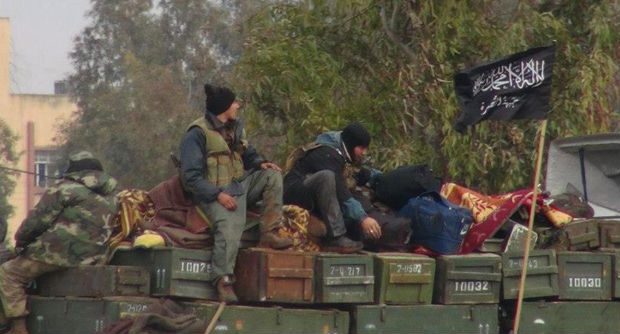UN experts recommend new sanctions on terrorists

In this Friday, Jan. 11, 2013 file photo, citizen journalism image provided by an anti-Bashar Assad activist group Edlib News Network (ENN), which has been authenticated based on its contents and other AP reporting, rebels from al-Qaida-affiliated Jabhat al-Nusra, also known as the Nusra Front, sit on a truck full of ammunition at Taftanaz air base, that was captured by the rebels in Idlib province, northern Syria. AP
UNITED NATIONS — A United Nations (UN) panel of experts monitoring al-Qaida is recommending new sanctions that would authorize the seizure of tanker trucks carrying oil from areas in Syria and Iraq controlled by the Islamic State group or the Nusra Front.
In a report circulated to the UN Security Council late Monday, the panel also recommended that the council order a worldwide moratorium on the trading of antiquities from Syria and Iraq — and order all countries to deny aircraft permission to land or take off if they are coming from or going to territory held by the two terrorist groups.
The eight-member expert panel cautioned, however, that while sanctions can play “a meaningful role” in disrupting the Islamic State militants and the al-Qaida-linked Nusra Front, they are “insufficient” alone to deal with the threats the groups pose to the Middle East and the world. It called for greater information sharing by governments and measures by all countries to target arms sales, recruitment and financing for the terrorist groups.
The panel issued the report in response to a request by the Security Council in an Aug. 15 resolution for an assessment of the threat posed by the Islamic State group, which has taken control of vast swaths of Syria and Iraq, and the Nusra Front in Syria, including their sources of arms and funding.
According to the experts, member states suggest that the Islamic State group has over 20,000 fighters, with some estimates running higher than 30,000, including foreigners from over 80 countries. Its leadership is mainly Iraqi, headed by Abu Bakr al-Baghdadi who has declared himself “caliph” with authority over the entire Muslim world, and two deputies, Abu Ali al-Anbari who is in charge of operations in Syria and Abu Muslim al-Turkmani who is responsible for Iraq operations, the experts said.
The panel said the Nusra Front carries out terrorist attacks directed at both the Syrian government and civilian targets, including minorities, and is comprised of a core group of Syrian and Mideast fighters supporters by foreign terrorist fighters.
Both groups have used the Syrian conflict “as a pretext to seek international donations and volunteers, generating multimillion-dollar financial resources and attracting thousands of foreign terrorist fighters,” it said.
In what it called “a high-confidence judgment,” the panel said both groups are very well-armed mainly because they operate in a conflict zone awash with conventional weapons. It said the Islamic State group is especially well-armed because of heavy weapons seized from the Iraqi military, possibly including surface-to-air missiles, anti-aircraft guns, aircraft and tanks.
As for funding, the experts said the Islamic State group is self-sufficient with revenue from oil sales, kidnapping for ransom, extortion and donations. One member state that was not identified estimated that the group is able to produce approximately 47,000 barrels of crude oil per day from fields under its control in northern Iraq and Syria. Using a price range of $18 to $35 per barrel, the group’s estimated potential revenue from crude oil ranges from $846,000 to $1.645 million per day, the panel said.
It said ordering the seizure of all tanker trucks would “disrupt crude oil smuggling that generates revenue for these groups.”
The experts said information from member states indicates the Islamic State group also raised an estimated $35 million to $45 million in a 12-month period from ransom payments.
The panel said the Nusra Front’s finances are “more opaque.” It cited reports from three member states that the group is dependent on donations from private financiers in the region, and said there are indications it may be smuggling — or trying to smuggle — antiquities to generate revenue.